Excellent 7 Reasons Rigatoni Pasta Delivers Big Flavor & Texture
Focus keyword: rigatoni pasta
Rigatoni pasta is one of Italy’s boldest pasta shapes, instantly recognizable for its ridges and wide hollow tubes. From Roman kitchens to modern comfort food, rigatoni has become a pasta that thrives in both rustic and refined cooking.
This comprehensive guide explores everything you need to know, including origins, varieties, cooking tips, nutritional facts, sauce pairings, recipes, and why rigatoni remains a staple on Italian dining tables.
Table of Contents
1. What Is Rigatoni Pasta?
Rigatoni are large, tubular pastas with ridges running along their sides. Its ends are cut straight rather than diagonally, which sets it apart from penne pasta.
Shape: Cylindrical, wide diameter.
Surface: Ridges that hold thick sauces.
Texture: Firm, hearty bite.
The name “rigatoni” comes from rigare, meaning “to engrave” or “to furrow.” The grooves make rigatoni ideal for capturing sauce inside and out.
http://youtube.com/watch?v=ioyK5GE2dL4&utm_source=chatgpt.com
2. The Origins of Rigatoni
Rigatoni comes from central and southern Italy, particularly Rome and Sicily. Roman cooks embraced rigatoni because of its durability with rich ragùs and slow-cooked sauces.
Compared to tagliatelle in Emilia-Romagna or pappardelle in Tuscany, rigatoni reflects Rome’s love of bold, meaty dishes.
Fun fact: Rigatoni alla Pajata (Roman specialty with veal intestines and tomato sauce) was once a staple of working-class cuisine.
3. Varieties and Styles
Rigatoni isn’t one-size-fits-all. Here are the main versions:
Standard Rigatoni: The classic size, about 1 inch long.
Rigatoni: Smaller and thinner, perfect for lighter sauces.
Large Rigatoni: Extra-wide, excellent for baking dishes.

Comparisons:
Ziti – smooth tubes, often baked.
Penne – diagonally cut, smaller.
Bucatini – long, hollow spaghetti.
- http://youtube.com/watch?v=rRMcik30l0k&utm_source=chatgpt.com
4. The Science Behind Rigatoni’s Shape
Rigatoni’s design isn’t random—it’s culinary engineering:
Ridges trap sauce, cheese, and meat.
Flat ends keep it upright in baked dishes.
Wide diameter makes it sturdy for chunkier sauces.
Thicker walls resist breaking during boiling or baking.
Where spaghetti excels with light sauces, rigatoni demands bold flavors.
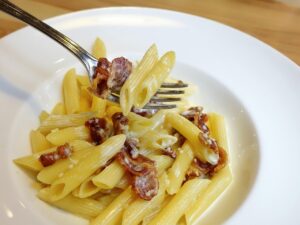
5. Cooking Rigatoni Perfectly
Steps:
Boil water in a large pot (1 liter per 100 grams of pasta).
Add salt generously.
Stir rigatoni in the first minute.
Cook for 10–12 minutes to achieve an al dente texture.
For baked rigatoni, undercook by 2–3 minutes.
Save pasta water to blend with the sauce.
Tip: Don’t rinse rigatoni unless preparing cold pasta salad.
For details: How to cook pasta like an Italian.
6. Nutritional Profile
Standard rigatoni pasta (100g dry):
Calories: 350
Protein: 12g
Carbs: 70g
Fiber: 3g
Fat: 1g
Whole wheat or legume-based rigatoni offers an extra boost of fiber and protein.
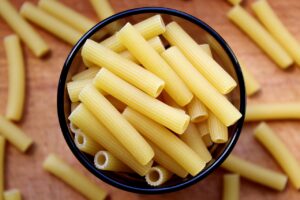
7.
Best Sauces
What sauces work best with it?
It pairs best with thick, bold sauces that need a pasta shape with structure and ridges to cling to. Its wide tubes capture sauce, while the ridged exterior keeps it on the surface, creating full, balanced bites.
Meat ragù (classic Roman style)
It excels with slow-cooked meat ragùs. The chunky texture of beef, pork, or mixed-meat sauces settles inside the tubes, while the ridges keep the sauce from sliding off. This pairing is a cornerstone of Roman cooking.
Tomato-based sauces with vegetables
Vegetable-forward tomato sauces with zucchini, eggplant, peppers, or mushrooms pair naturally with rigatoni. The pasta’s shape traps both sauce and vegetables, preventing lighter ingredients from separating.
Spicy arrabbiata
It is ideal for arrabbiata sauce. The chili heat, garlic, and tomato cling to the ridges, while the hollow center holds bursts of spicy sauce, delivering intensity without overpowering the dish.
Cream-based sauces with mushrooms
Creamy mushroom sauces coat rigatoni evenly and stay anchored to the pasta’s surface. The firm bite of rigatoni balances the richness of cream, preventing the dish from feeling heavy.
Baked with béchamel and cheese
It performs exceptionally well in baked dishes. Béchamel and cheese melt into the tubes, while the pasta maintains its shape through oven cooking. This makes it a top choice for casseroles and layered bakes.
It stands out because it supports sauces that demand structure. When the sauce is thick, textured, or rich, it delivers the best possible bite.
8. Recipes You Must Try
Here are some standout recipes with video tutorials:
9.
Rigatoni in Italian Culture
It holds a respected place in Italian food culture, especially in Roman cuisine, where bold flavors and sturdy pasta shapes define many traditional dishes. Its wide tubes and deep ridges make it ideal for sauces that rely on fat, protein, and intensity rather than delicacy.
In Rome, it appears in classic preparations such as rigatoni alla Carbonara and rigatoni con pajata. These dishes reflect a core principle of Italian cooking: elevating simple, affordable ingredients through technique and balance. Its structure allows egg-based sauces, cured pork, and rich offal-based ragùs to cling firmly, ensuring flavor in every bite.
Beyond Italy, it became a staple of Italian-American cooking, where it adapted naturally to baked casseroles and cheese-heavy dishes. Baked rigatoni, layered with tomato sauce, meat, and melted cheese, mirrors the celebratory, communal style of meals shared at family gatherings. The pasta’s ability to hold its shape through long baking times made it a practical and popular choice.
Its journey from Roman trattorias to Italian-American kitchens shows how pasta travels across cultures without losing its identity. Its strength, versatility, and sauce-gripping design explain why it remains one of the most trusted and widely used pasta shapes in both traditional and modern cooking.
Trends:
Whole-grain rigatoni
Gluten-free chickpea rigatoni
Bronze-cut artisanal rigatoni
Learn more from our Soba pasta, Lumache pasta, Ruote pasta, Guides
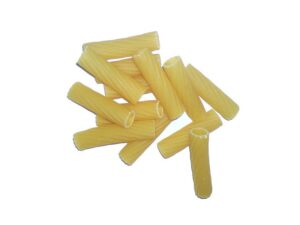
Noodles, Carbohydrates, Rigatoni image
11. Rigatoni vs Other Pasta Types
Rigatoni vs. Penne: Rigatoni is larger and ridged, while penne is smaller and diagonally cut.
Rigatoni Ziti: Ziti is smooth and often used in American-Italian dishes.
Rigatoni vs Bucatini: Bucatini is long spaghetti with a hole down the center, suited for lighter sauces.
12.
FAQs
Q: How long does rigatoni take to cook?
It typically cooks in 10–12 minutes until al dente. For baked dishes, reduce the boiling time by 2–3 minutes so the pasta finishes cooking in the oven without becoming soft or collapsing.
Q: Canit be used in pasta salad?
Yes. It works very well in pasta salads because its ridges and wide tubes hold dressing inside and out. After cooking, cool it completely before mixing with vinaigrette-style dressings, vegetables, or proteins to keep the texture firm.
Q: Is it healthier than other pastas?
It has a nutritional profile similar to most wheat-based pastas. However, whole wheat provides more fiber and promotes longer satiety. The dish’s healthfulness depends largely on portion size and sauce choice.
Q: Why choose the bronze-cut one?
Bronze-cut has a slightly rough surface created by traditional extrusion methods. This texture grips sauce more effectively than smooth pasta, resulting in better flavor distribution and a more satisfying bite.
Q: Doesit hold sauce better than penne or ziti?
Yes. Its wider diameter and deeper ridges allow it to trap thicker sauces more efficiently than narrower tubes. Chunky meat sauces, vegetable ragùs, and baked preparations benefit most from its structure.
Why is it considered the Best Pasta?
It is often called the best pasta because it balances shape, texture, and versatility better than most pasta types. Its ridged exterior grips sauce, while the wide, hollow center captures chunks of meat, vegetables, and cheese in every bite.
The pasta’s thickness gives it a firm, satisfying chew that holds up well during baking and reheating. Unlike thinner shapes, rigatoni does not collapse under heavy sauces or long cooking times.
It is also highly versatile. It works equally well in baked casseroles, stovetop dishes, vegetable-forward recipes, and even cold pasta salads. Few pasta shapes handle such a wide range of sauces and cooking methods without losing structure.
In short, it stands out for its excellent sauce grip, sturdy texture, and adaptability, making it a reliable choice for both everyday meals and classic Italian recipes.
13.
Conclusion
Rigatoni earns its reputation through performance. Its wide tubes, deep ridges, and firm structure allow it to handle sauces that overwhelm lighter pasta shapes. From classic Roman ragùs and spicy arrabbiata to creamy mushroom sauces and baked dishes layered with béchamel and cheese, rigatoni delivers consistent texture and full flavor in every bite.
What sets rigatoni apart is balance. It grips sauce without becoming heavy, stays intact through long cooking, and adapts easily to both traditional Italian recipes and modern home cooking. Few pasta shapes offer the same combination of strength, versatility, and reliability.
Call to Action
Put rigatoni to work in your kitchen. Try it with a slow-simmered meat ragù, bake it with cheese and béchamel, or toss it with vegetables and a bold tomato sauce to experience how well it carries flavor.
Explore more pasta shape guides, cooking tips, and authentic Italian pairings on PastaLoverz.com. If this guide helped you choose the right sauce or recipe, save it, share it with fellow pasta lovers, and keep discovering why the right pasta shape makes all the difference.

Syed Yasar Arafat is the founder of PastaLoverz.com and a food research enthusiast with a focused interest in pasta varieties, traditional Italian cuisine, and balanced eating. Through PastaLoverz.com, he publishes well-researched articles that explain pasta types, cooking methods, and nutritional considerations in clear, practical terms to help readers make informed food choices.
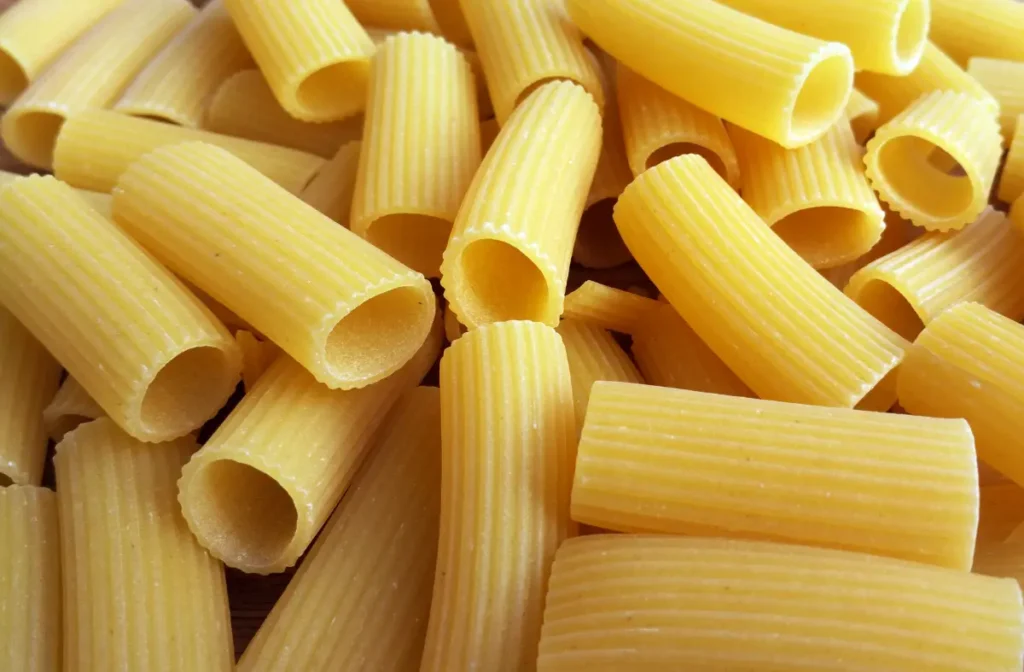
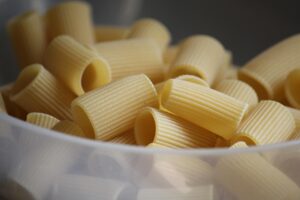
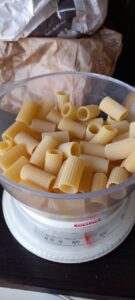
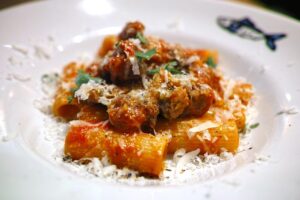
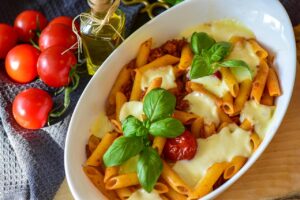
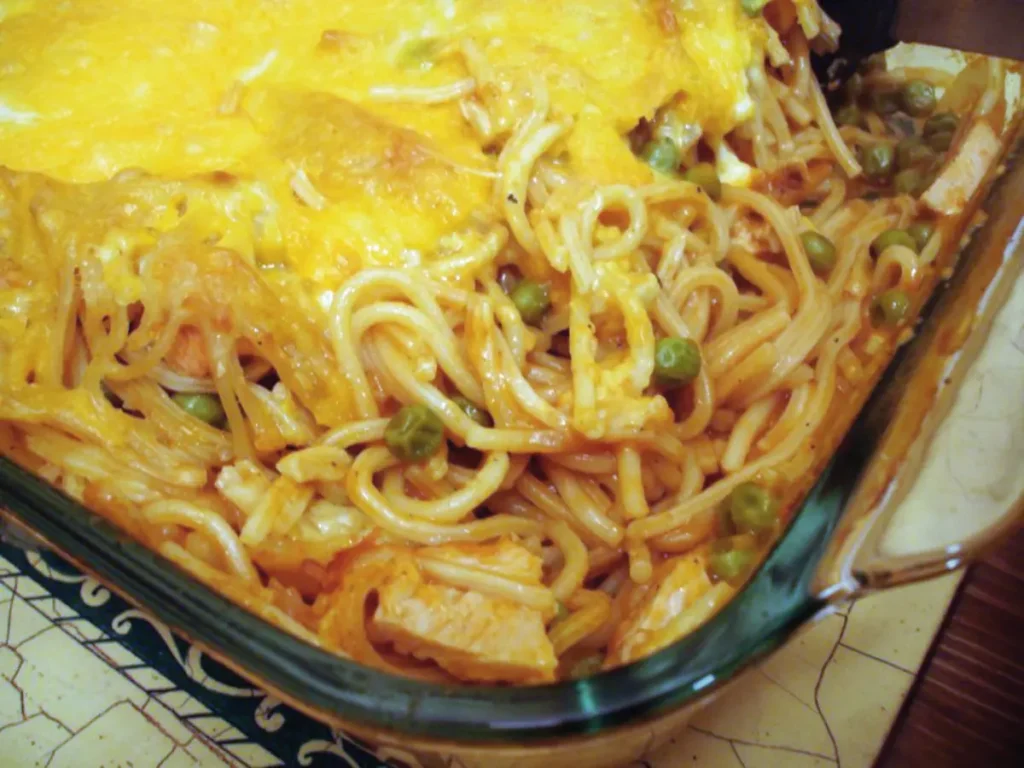
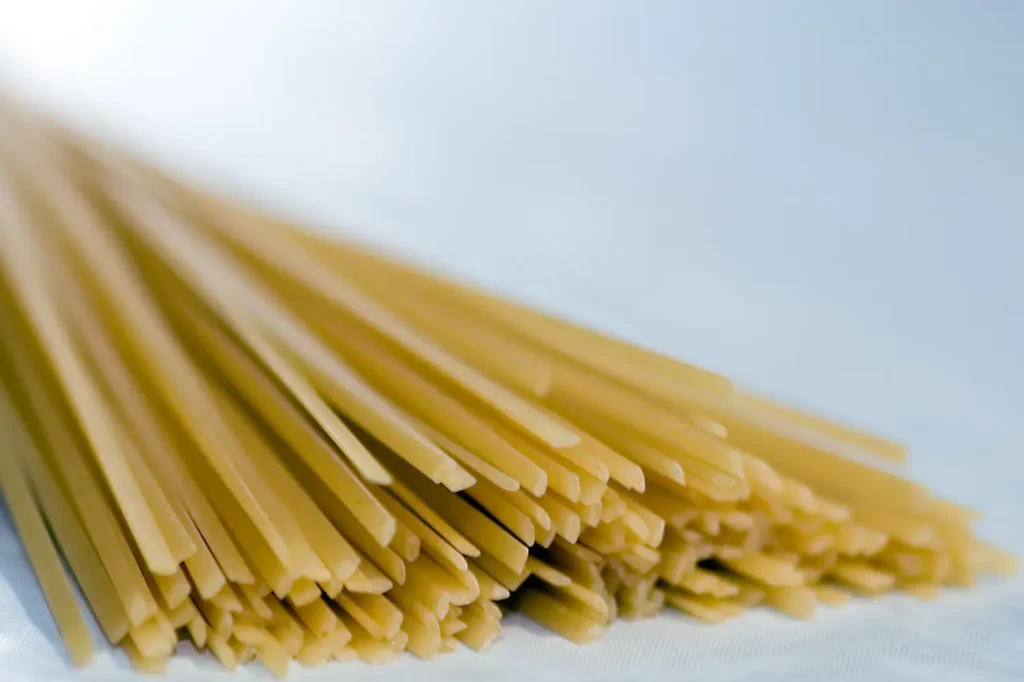
Pingback: Ziti Pasta: 7 Proven Secrets to Master This Baked Italian Classic
Pingback: Macaroni Pasta: 7 Powerful Secrets to Master This Classic Favorite
Pingback: Delicious Tortiglioni Pasta: 9 Proven Secrets to Master the Perfect Twisted Tube
Pingback: Ruote Pasta Explained: Powerful 7-Fact Guide You’ll Love